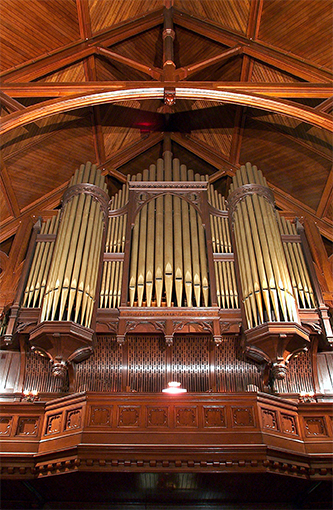 The Sayles Hall Organ was a gift in 1903 of Lucian Sharpe (class of 1893) in memory of his parents. The Latin inscription on the organ’s oak case reads,“Parentibus et Academiae Pignus Pietatis” or “to (my) parents and the academy, a token of devotion.” For many years, the student body had been extremely vocal about wanting a pipe organ. In his annual report of 1902, President Faunce referred to a new organ for Sayles Hall as “one of our greatest small needs.” Following the lead of Symphony Hall in Boston, Vassar and Yale, the University contracted with the Hutchings-Votey Company of Boston. To receive the organ, which weighed about 25 tons, the old gallery in Sayles Hall was replaced by a new one with a projecting center, under the direction of architects Stone,Carpenter, and Willson. The Hutchings-Votey Organ has three manuals, with fifty-one speaking stops, more than three thousand pipes, wind reservoirs,and over on hundred miles of wiring. The swell and choir organs are enclosed in separate swell boxes.
The Sayles Hall Organ was a gift in 1903 of Lucian Sharpe (class of 1893) in memory of his parents. The Latin inscription on the organ’s oak case reads,“Parentibus et Academiae Pignus Pietatis” or “to (my) parents and the academy, a token of devotion.” For many years, the student body had been extremely vocal about wanting a pipe organ. In his annual report of 1902, President Faunce referred to a new organ for Sayles Hall as “one of our greatest small needs.” Following the lead of Symphony Hall in Boston, Vassar and Yale, the University contracted with the Hutchings-Votey Company of Boston. To receive the organ, which weighed about 25 tons, the old gallery in Sayles Hall was replaced by a new one with a projecting center, under the direction of architects Stone,Carpenter, and Willson. The Hutchings-Votey Organ has three manuals, with fifty-one speaking stops, more than three thousand pipes, wind reservoirs,and over on hundred miles of wiring. The swell and choir organs are enclosed in separate swell boxes.
At Commencement in June 1903, the opening recital was performed by eminent Belgian organist Chevalier Auguste Wiengand, who was then the Sydney Town Hall Organist. In 1924,Mrs. Lownes endowed an annual organ recital known as “Edgar J. Lownes Memory Day,” a memorial to her late husband. In 1949, the organ received its first complete renovation,which involved the installation of a new console designed by the Schantz Organ Company. The organ fell into a state of disrepair in the 1980’s after hurricane water damage. The latest renovation of the instrument was undertaken in 1990 by the Potter-Rathburn Organ Company of Cranston, RI. By the 1950’s, the trend of much of the organ world was the replace, rather than restore or repair, and many fine instruments were lost. Fortunately the Brown organ is still sounding forth and is now the largest remaining Hutchings-Votey organ
Adapted from Encyclopaedia Brunonia, Martha Mitchell, and the Brown Alumni Monthly, May 1903
| Great | Swell | Choir | Pedal | ||||
|---|---|---|---|---|---|---|---|
| 16 | Open Diapason | 16 | Bourdon | 16 | Dulciana | 32 | Bourdon |
| 8 | First Open Diapason | 8 | Open Diapason | 8 | Violin Diapason | 16 | Open Diapason |
| 8 | Second Open Diapason | 8 | Second Diapason | 8 | Concert Flute | 16 | Bourdon |
| 8 | Gross Floete | 8 | Quintadena | 8 | Gedackt | 16 | Soft Bourdon (Sw) |
| 8 | Gamba | 8 | Viole d'Orchestre | 8 | Salicional | 16 | Violone |
| 8 | Gemshorn | 8 | Vox Celestis | 8 | Dulciana | 16 | Dulciana (Ch) |
| 4 | Octave | 8 | Viola | 8 | Unda Maris | 8 | Flute |
| 4 | Wald Flute | 4 | Aeoline | 4 | Rohr Flute | 8 | Gedackt |
| 2-2/3 | Twelfth | 4 | Octave | 4 | Vlolina | 8 | Violoincello |
| 2 | Fifteen | 4 | Flauto Traverso | 2 | Piccolo | 5-1/3 | Quint |
| Mitxure IV | 2-2/3 | Nazard | 16 | Fafaotto | 4 | Super Octave | |
| 8 | Trumpet | 2 | Flautino | 8 | Clarinet | 16 | Trombone |
| Tremolo | Dolce Cornet IV | Tremolo | 8 | Trumpet (ext.) | |||
| 8 | Festival Trumpet (Sw) | 16 | Double Trumpet | ||||
| 4 | Clarion (Sw) | 8 | Festive Trumpet | ||||
| 8 | Cornopean | ||||||
| 8 | Oboe | ||||||
| 8 | Vox Humana | ||||||
| 4 | Clarion | ||||||
| Tremolo | |||||||